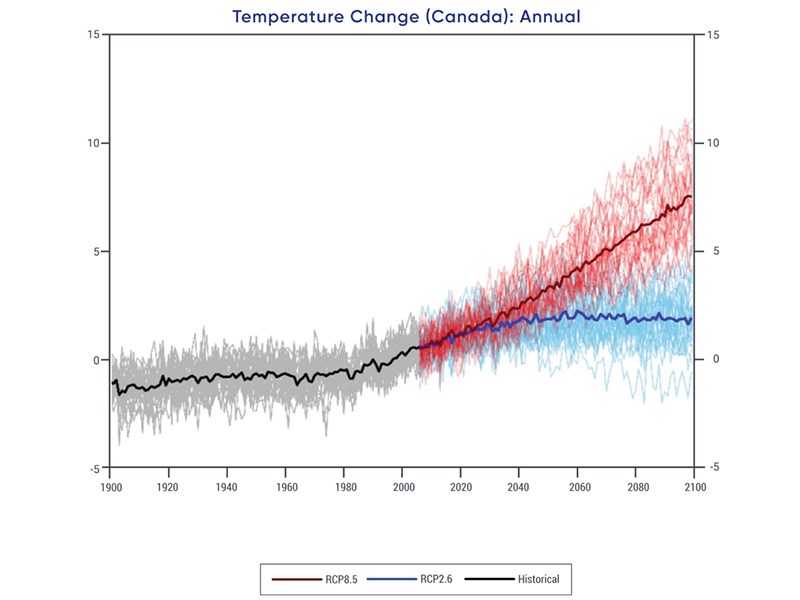Climate change is having an effect locally and experts are recommending adjusted targets for carbon neutrality, according to City of Powell River’s sustainability planner.
At the Tuesday, June 18, committee of the whole meeting, sustainability planner Ana Lukyanova reported on the status of climate emergency, which has been endorsed by the city and qathet Regional District.
Lukyanova said the city declared a climate emergency on February 21, 2019. In doing so, it joined more than 400 Canadian municipalities, representing more than 12 million people, that have passed climate emergency declarations.
“The declarations have really been prompted by the special UN Intergovernmental Panel on Climate Change (IPCC) report, published in October of 2018,” said Lukyanova. “It’s a group of over 1,000 scientists and is a world authority on climate change science.”
Lukyanova said the IPCC was established by the United Nations more than 30 years ago and the objective is to provide governments at all levels with scientific information they can use to develop climate policies. The IPCC does not do the research but compiles existing studies from around the world and condenses them for policy makers.
In October 2018, the IPCC came out with a special report outside of the regular climate reports the organization releases.
“They felt compelled to do the special report because new scientific evidence came out about the harm of allowing the climate to warm to two degrees,” said Lukyanova. “Previously, the goal set by governments was to keep that warming within two degrees, but the special report told us we needed to stay within one and a half degrees to avoid the increased risks for food and water security, health, development and economic growth.
Lukyanova said the special report has spurred declarations of climate emergencies across the world.
More recently, the Canadian government released its Canada Changing Climate Report, which highlighted that climate in Canada will warm at twice the rate of the global average. Lukyanova said climate is not rising uniformly across the world and some areas are warming faster.
Impacts are being seen in Powell River and North America, said Lukyanova. Canadian families are expected to spend $400 more for food in 2019 compared to 2018, she added. That is tied to increased produce prices because of poor growing conditions related to climate change, she said.
Lukyanova then pointed to a Peak news story from October 2017 indicating that water levels in Powell Lake were unusually low. At the time the measurement was about 15 metres lower than the reservoir’s normal operating level. Brookfield Power representatives said it was due to an extreme lack of precipitation in the watershed.
Wildfire smoke was also having an impact, said Lukyanova, and she outlined a story indicating that cities in BC were in the worst air quality category in the world during the wildfire season.
“Of course, there are health impacts associated with that,” said Lukyanova. “There are impacts to the economy; the BC tourism industry is recording a loss of revenue in the wildfire season.”
There are also impacts on salmon, with rising water temperatures and lack of precipitation having effects.
There are recommendations arising from the IPCC report, according to Lukyanova. The first is to commit to becoming carbon neutral in corporate operations in 2019 and beyond. She said the city, corporately, became carbon neutral in 2018.
“I want to emphasize this is not a new commitment,” said Lukyanova. “Under the BC Climate Action Charter, we have committed since 2007 to be carbon neutral in corporate operations. The original commitment was to become carbon neutral in 2012.”
On the community side, in the official community plan (OCP), there are greenhouse gas emission reduction targets. Lukyanova said there is a target of a 32 per cent reduction from 2007 to 2020, and an 80 per cent reduction by 2050.
“We are required to have greenhouse gas emission reduction targets in our OCP by the local government charter,” said Lukyanova.
There are guidelines for accomplishing the goals. Transportation is by far the largest emissions source in the community, according to Lukyanova. Goals include shifting from vehicles to active modes of transportation, such as transit, cycling and walking.
In 2007, per capita greenhouse gas emissions locally were 4.9 tonnes of carbon dioxide equivalent.
According to a recent assessment by a BCIT scientist, Powell River has not hit the 2016 target and is actually going up in terms of emissions. The refined emissions targets based on the IPCC report would provide for 45 per cent lower emissions by 2030 and zero emissions by 2050.
Lukyanova said there is a recommendation to direct staff to prepare a report that prioritizes the integrated community sustainability plan, community energy and emissions plan, and carbon neutral action plan actions related to climate change mitigation and adaptation, and update the plans as needed to address the revised community emissions reduction target.
Councillor Jim Palm said there was a lot of information and targets. He asked how this will be achieved.
Lukyanova said there is a list of actions in the OCP, which is why she recommends going back to that document to prioritize.
Councillor CaroleAnn Leishman said the report was a great synopsis of the work that still has to come and the detail the city needs to get into. For targets the community is not on target to meet, there is a need to “amp up” the direction.
Leishman said Lukyanova had done a good job of making the material understandable.
“When the reports come back it is going to be clear looking at, for example, the 30-year payback,” said Leishman. “The 30 years will go by in a blink of an eye and to make those initial investments in reducing our carbon is also going to reduce our utility costs and reduce maintenance costs in a lot of areas. Having that ability to look at how the long-term effect is going to mean money in the bank is really important.”



.jpg;w=120;h=80;mode=crop)